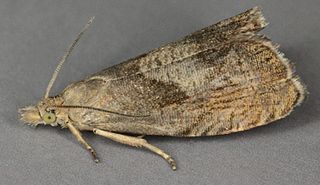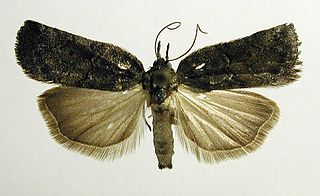
Apamea crenata, known as the clouded-bordered brindle, is a moth in the family Noctuidae. It is distributed throughout the Palearctic realm. In the North it crosses the Arctic Circle, in the Mediterranean it is found only in cool locations and mountains avoiding very hot areas. In the Alps, it rises to an altitude of about 2000 metres.

Lozotaenia forsterana is a moth of the family Tortricidae. It is found in Europe and across the Palearctic.

Dichrorampha acuminatana is a moth of the family Tortricidae. It is found in Europe and the Near East.

Dichrorampha simpliciana is a moth of the family Tortricidae. It is found in Europe and the Near East.

Epinotia solandriana is a moth of the family Tortricidae. It is found in Europe, China, Korea, Japan, and Russia.

Mesapamea secalis, the common rustic, is a moth of the family Noctuidae. The species was first described by Carl Linnaeus in his 1758 10th edition of Systema Naturae. It is found in Europe, north-west Africa, Turkey and northern Iran.

Nycteola revayana, the oak nycteoline, is a moth of the family Nolidae. The species was first described by Giovanni Antonio Scopoli in 1772. It is found from Europe and east across the Palearctic to Japan and India.

Apotomis betuletana is a moth of the family Tortricidae. It is found in most of Europe. It is also found in the eastern part of the Palearctic realm.

Dichrorampha alpinana, the broad-blotch drill, is a species of moth of the family Tortricidae. It is found in almost all of Europe.

Cochylichroa atricapitana, the black-headed conch, is a moth of the family Tortricidae. It is found in China (Xinjiang) and the eastern Palearctic and most of Europe.
Platynota breviplicana is a species of moth of the family Tortricidae. It is found in Grenada.

Ancylis myrtillana is a moth of the family Tortricidae. It was described by Treitschke in 1830. It is found in most of Europe and across the Palearctic.It has also been recorded in North America. The habitat consists of moorland.

Gynnidomorpha alismana, the water plantain conch, is a moth of the family Tortricidae. It was described by Ragonot in 1883. It is found in most of Europe, except Spain, Switzerland, most of the Balkan Peninsula and Ukraine. Further east it is found across the Palearctic to China and Korea. It is found in riverine and other watery habitats.

Phtheochroa inopiana, the plain conch, is a species of moth of the family Tortricidae. It is found in China, Iran, Japan, Mongolia, Russia and most of Europe. It has also been recorded in North America. The habitat consists of damp areas and woodland edges.
Apocydia pervicax is a species of moth of the family Tortricidae. It is found in Australia, where it has been recorded from Queensland, New South Wales and the Northern Territory.
Toonavora aellaea is a species of moth of the family Tortricidae. It is found in Australia, where it has been recorded from Queensland and New South Wales.
Bactra testudinea is a species of moth of the family Tortricidae. It is found in Australia, where it has been recorded from Queensland.
Heleanna chloreis is a species of moth of the family Tortricidae. It is found in Australia, where it has been recorded from Queensland.

Epinotia nemorivaga, the bearberry bell, is a species of moth in the family Tortricidae. It is found in Europe and Asia.

Pammene obscurana is a moth belonging to the family Tortricidae. The species was first described by James Francis Stephens in 1834.














